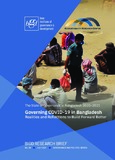Governing COVID-19 in Bangladesh: Realities and Reflections to Build Forward Better
Date
2021-07Author
Hassan, Mirza
Hossain, Naomi
Islam, Sirajul
Hoque, Rafsanul
Khan, Insiya
Salina Aziz, Syeda
Nahreen, Avia
Ul Hoque, Mahan
Osmani, S.R.
Siddiquee, M.S.H.
Sultan, Maheen
Jahan Antara, Iffat
Zaman, Shahaduz
Hossain, Faruq
Matin, Imran
Metadata
Show full item recordImpact
Abstract
COVID-19 has been an unprecedented stress test of health, social, economic,
and political systems worldwide.i
The State of Governance in Bangladesh 2020–
2021 report documents and analyzes how COVID-19 has been governed in
Bangladesh. It aims to evaluate and inform responses to the ongoing pandemic
and also indicate how to “build forward better”—strengthen our capacities to
tackle similar and other types of crises in future.
COVID-19 is a global shock (see Figure 1), but its impact has been particularly
profound in countries like Bangladesh. A weak public health system and
precarious economic state of the majority of citizens, combined with a growing
yet underdeveloped social security system, have enabled the COVID-19 crisis
to present a stark “life vs livelihood” challenge for policymakers.ii How the crisis
is governed closely shapes both the health and the livelihood outcomes for
Bangladeshi people.

